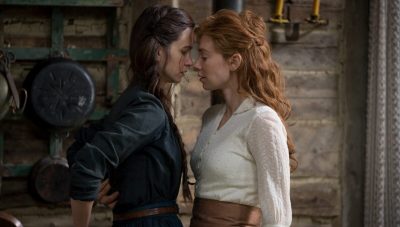


Waterston and Affleck play Abigail and Dyer, a young farming couple who become emotionally detached from each other after the death of their 5-year-old daughter. When they meet new neighbors Tally and Finney (Kirby and Abbott), a new energy is injected into Abigail as she and Tally develop a fast friendship. As the friendship blossoms into a relationship that turns sexual and their husbands grow increasingly suspicious and jealous of their wives’ connection, Abigail and Tally go to great lengths to protect their newfound love.
Screenwriters Ron Hansen and Jim Shepard don’t break any new ground with this story, treading the same familiar path as other recent period lesbian romances such as Vita & Virginia, Portrait of a Lady on Fire and Ammonite. Told through Abigail’s point-of-view, the script relies heavily on voice-over narration, through which Abigail tells us her every thought and emotion, as she reads pages from her diary. She is miserable, stuck in her own mind-numbing existence, and only when this vibrant and charismatic woman barges into her life does she awaken. The narration provides a substitute for any real action in the film, except for the scenes that illustrate what a miserable existence it in fact is, but the over-reliance on it to inform the audience as to Abigail’s state of mind takes so much away from Waterston, an actress who we know has the ability to do more than gaze into the distance.
As for Kirby, her Tally is quite the opposite, all swagger and charm when she arrives on the scene, not at all believable for the place and time she inhabits, but infectious nonetheless. Everything about her character feels out of place, almost anachronistic, despite Kirby’s unendingly charming performance. Still, the best parts of this movie are the scenes where Abigail and Tally are engaging with one another, and these are the moments when Waterston and Kirby’s talents as actresses lift this film out of the mire.
Fastvold’s direction is far too restraining, however, as we never fully believe the passion between Abigail and Tally. The structure of the film, where we only understand the breadth and depth of their relationship at the very end, undermines the very thing that we should be invested in, as an audience. There is much more of an emphasis on Dyer and Finney’s unraveling emotional states than on Abigail and Tally’s sexually awakened ones, which manages to even turn a lesbian romance into a movie about the delicate male ego. That may be the point, especially with the backdrop of a patriarchal society that subjugates women and never allows them to feel joy, but it felt completely contrary to what this film was trying to achieve. Affleck and Abbott are both excellent as the manifestations of that society that short circuits when a woman asserts just a moment of independence, but it is still disappointing to see their characters given more texture than the two female leads.
The World to Come is a film that wants to be defined more by its mood and worldview than by its narrative and character development, and the end result is a disappointing and unmemorable experience that shortchanges the impressive efforts of its cast and continues to prove that Hollywood still has a long way to go in telling queer stories in ways that aren’t demeaning, depressing or dismissing.
